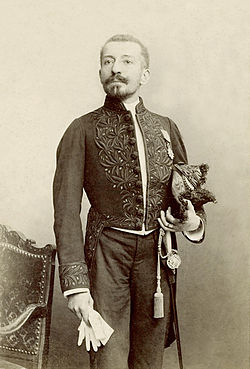Pierre Loti
| Louis Marie-Julien Viaud | |
|---|---|

Pierre Loti on the day of his reception at the Académie Française, 7 April 1892
|
|
| Born |
14 January 1850 Rochefort, Charente-Maritime, France |
| Died | 10 June 1923 (aged 73) Hendaye, France |
| Pen name | Pierre Loti |
| Occupation | French navy officer, novelist |
| Nationality | French |
|
|
|
| Signature |  |
Pierre Loti (French: [lɔti]; pseudonym of Louis Marie-Julien Viaud [vjo]; 14 January 1850 – 10 June 1923) was a French naval officer and novelist, known for his exotic novels.
Born to a Protestant family, Loti's education began in his birthplace, Rochefort, Charente-Maritime. At age 17 he entered the naval school in Brest and studied at Le Borda. He gradually rose in his profession, attaining the rank of captain in 1906. In January 1910 he went on the reserve list. He was in the habit of claiming that he never read books, saying to the Académie française on the day of his introduction (7 April 1892), "Loti ne sait pas lire" ("Loti doesn't know how to read"), but testimony from friends proves otherwise, as does his library, much of which is preserved in his house in Rochefort. In 1876 fellow naval officers persuaded him to turn into a novel passages in his diary dealing with some curious experiences at Istanbul. The result was the anonymously published Aziyadé (1879), part romance, part autobiography, like the work of his admirer, Marcel Proust, after him.
Loti proceeded to the South Seas as part of his naval training, living in Papeete, Tahiti for two months in 1872, where he "went native". Several years later he published the Polynesian idyll originally titled Rarahu (1880), which was reprinted as Le Mariage de Loti, the first book to introduce him to the wider public. His narrator explains that the name Loti was bestowed on him by the natives, after his mispronunciation of "roti" (a red flower). The book inspired the 1883 opera Lakmé by Léo Delibes. Loti Bain, a shallow pool at the base of the Fautaua Falls, is named for Loti.
...
Wikipedia
